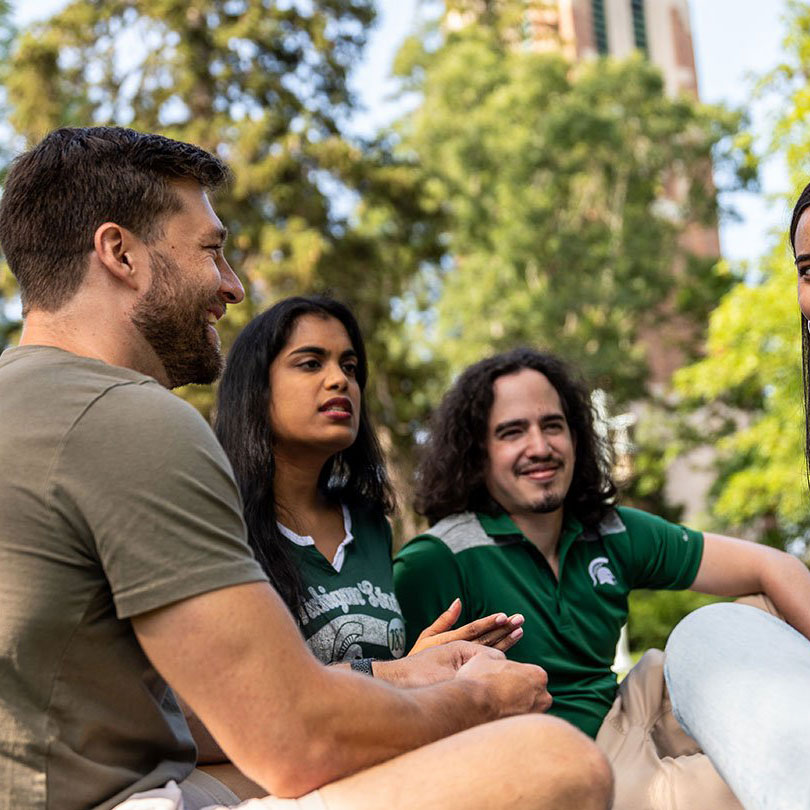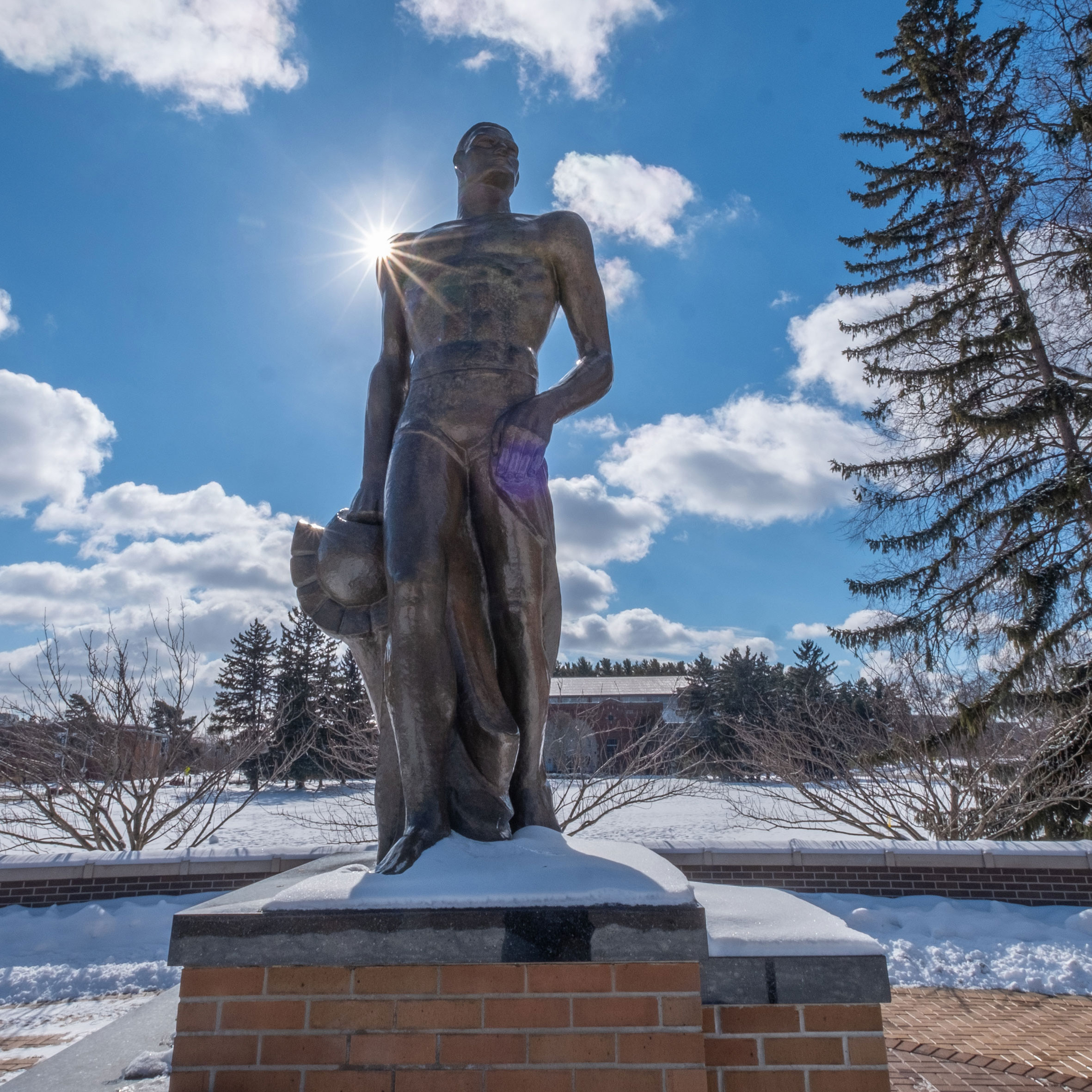Card Section
Admissions
Apply as a transfer student if you have attended a postsecondary institution after graduating from high school (except for attendance during the summer term immediately following graduation) OR if you have earned a bachelor’s degree at another college or university and are seeking to earn another bachelor’s degree or teaching certificate. Early College students with college credits will still need to apply as a first-years entering from a high school.
If you are…
- transferring to the College of Engineering from another U.S. institution, then you are a transfer student. Please contact us directly (future-engineer@egr.msu.edu).
- transferring to the College of Engineering from within MSU then you are an internal transfer student. Please contact Lindsay Naylor (naylorli@msu.edu).
- transferring to the College of Engineering from an institution outside of the U.S., you are an international transfer student. Please contact the MSU Office of Admissions directly and one of the international counselors will help you.
Yes, non-traditional students share the same application requirements and process as all transfer students.
As a transfer applicant, you may be considered as an engineering exploratory or a direct admit candidate (i.e. directly admitted to the College of Engineering’s specific major). If you are transferring with less than 42 credits, you will be an engineering major preference student; if you are bringing in 42 or more credits will be considered for direct admission to your College of Engineering’s desired major.
To apply, you will need to access the MSU Office of Admissions application portal first, then put your intended major as engineering. Starting Spring 2022, an applicant must list three intended majors, one of which must be a non-restricted major.
A student admitted as an engineering exploratory major must take at least 12 credits at MSU in order to apply to the College of Engineering and declare their major. Such a student must also complete MTH 132, 133, PHY 183, CEM 141 & 161 (not for Computer Science/Data Science) and EGR 100/CSE 220/CSE 221 (depends on intended major).
Transfer students are encouraged to apply at least six months prior to their desired semester of enrollment. Admissions decisions are typically made 8 to 12 weeks after all application materials are received, which includes the application for admission, official transcripts, and standardized test scores for those with less than 28 college credits.
MSU uses rolling admission—meaning applications are reviewed as they come in—but in recent years the number of qualified applicants has exceeded the available space in each class. Please submit your application early to ensure availability.
Visit the MSU Office of Admissions transfer student page for details on steps to take after applying to MSU.
General admission to the university requires:
- An equivalent to MSU WRA 101/WRA 195H
- An equivalent to MSU MTH 101, 102, 103, 116 or higher; OR an equivalent to MSU STT 200 or 201
- 28 or more credits deemed transferable to MSU
- 3.0 GPA or higher, with consistent grade performance
Engineering transfer students applying with 42 or more credits are required to select a major within the College of Engineering and are subject to the admission requirements of that desired major. Transfer students applying with 41 or fewer credits can apply as engineering exploratory and are subject to the general admission requirements for the University as stated above.
A GPA of 3.0 or higher with consistent grade performance is required for transfer admission to Michigan State University. However, all majors in the College of Engineering are restricted majors, meaning they have additional GPA requirements: Applied Engineering, Biosystems Engineering, Civil Engineering, Computer Engineering, Electrical Engineering, and Environmental Engineering require a cumulative GPA of 3.2 and a technical GPA of 3.0; Chemical Engineering, Computer Science, and Materials Science & Engineering require a cumulative GPA of 3.4 and a technical GPA of 3.2; Mechanical Engineering requires a cumulative GPA of 3.6 and a technical GPA of 3.4. See the GPA calculator on this page.
For Computer Engineering, Computer Science, and Mechanical Engineering, CSE 231 (or equivalent) is required. For Electrical Engineering, CSE 220 (or equivalent) is required. Visit the MSU Office of Admissions Transfer Applicants page to see if your current/previous institution has an accepted equivalent.
High school transcripts must be submitted by transfer students who have less than 28 credits to transfer to MSU, as they are required after the point of admission as proof of graduation to reserve a spot in the incoming transfer class. Submitting standardized test scores (SAT/ACT) is optional.
You will not be admitted to the College of Engineering until you have completed the required courses and have the necessary technical and cumulative GPA. For more information, please contact our transfer student counselors, Luis Donado (donadoto@msu.edu) or Drew Kim (kima@msu.edu).
Starting Spring 2022, a transfer applicant must state three intended majors and one specifically in non-restricted major. So, if you are denied admission to the College of Engineering, you will then be considered for admission to the University with your specified unrestricted major.
All applicant’s academic performance in their most recent four semesters will be looked at more closely, especially for courses that are related to engineering required courses. In addition, an applicant’s academic trend (i.e. did your GPA increase or decrease over the last few semesters) will also be considered when making admission decision to an engineering major.
Credits
Visit the MSU Office of Admissions Transfer applicants page for information.
If you are transferring from a 2-year institution, you can transfer up to 60 credits. If you are transferring from a 4-year institution, there is no limit on the number of credits you can transfer. MSU requires a minimum of 30 credits to be completed at MSU.
- Visit What do engineers and computer scientists do?
- Attend an Engineering presentation and tour.
- Connect with our Student Ambassadors to learn about the engineering majors and personal transfer experiences.
Visit the MSU Office of Admissions Transfer Credits page for information. Grades lower than a “C” will not be transferrable as credit. All credit will be reviewed on a 4-point scale, and grades will follow according to the grading scale that is used at the institution you completed the course at.
Transfer credits are evaluated when your general application is reviewed—this means credit evaluation will take just as long as your admission decision (8-12 weeks).
A student’s standing depends on the number of credits they have successfully transferred to MSU, which is determined by the MSU Registrar’s Office. Visit Credits Per Grade Level to learn more.
Courses taken at military institutions often are not transferable to MSU; however, the MSU Office of Admissions Transfer Credit page provides more specifics. If your institution (in this case, a military academy) is not listed, it sometimes means that no one has attempted to transfer to MSU from that institution. In this case, an applicant should submit their syllabus (or syllabi) to the MSU Registrar’s Office to get evaluated for credit(s).
Yes, MSU accepts the Michigan Transfer Agreement. However, it is likely that you will need to take an additional 2-3 courses in order to satisfy university requirements at MSU.
Cost and Financial Aid
Yes! Transfer student scholarships are available for students transferring to MSU from both two and four-year institutions. The College of Engineering also offers transfer-specific undergraduate scholarships. No additional applications are required to apply for scholarships—the general application for admission will be used. Scholarships are typically awarded between late June and early August.
Visit the MSU Office of Admissions Cost and Aid page for information on tuition and fees.
The Engineering Program Fee is a fee paid on top of tuition by all undergraduate students who are admitted to the College of Engineering. The Engineering Program Fee is applied to a student account once each semester, regardless of how many majors or minors a student declares. The College of Engineering does not charge course fees on specific courses, but uses the Engineering Program Fee to maintain support for our labs, facilities, and shop intensive courses. The fee helps to cover the costs associated with:
- DECS (Division of Engineering Computing Services) support and equipment for computer labs in the Engineering Building, Wilson Hall, and Wonders Hall. Engineering computer labs are available only to students with Engineering accounts.
- TA positions for classes
- lab facilities in the departments
- lab equipment upgrades and repairs
- student organizations and projects.
The Engineering Program Fee differs depending on whether you are attending full or part-time, and whether you are enrolling for Fall, Spring, or Summer semesters. Visit the Office of the Controller’s Student Accounts website for tuition, fee, tax, and housing rates information for each semester.
Campus Life
Yes! Connect with our Student Ambassadors to learn about personal transfer experiences.
Yes, check out the Living and Dining website for more information.
This is different for each person as it depends on how many credits transfer to MSU, the courses taken at a previous institution(s), how many credits are taken each semester, if courses are taken over the summer, and if a student completes internships and/or co-ops, etc.
Yes, there is an organization called Circles of Success for any incoming student to be paired up with a professional staff mentor. MSU also has over 900 student organizations open to all students!
Because companies are constantly looking for college graduates with experience, the College of Engineering strongly encourages students to pursue co-ops and internships. Connect with the college Career Center for more information.
Quick Links
- College of Engineering Fast Facts
- Scholarships and Financial Resources
- The Center for Spartan Engineering
- MSU Transfer Student Admissions
- MSU Interactive Campus Map
- After You Apply
Thank you for your interest in Michigan State University's College of Engineering! If you have questions or need assistance scheduling a visit, please call our office at (517) 353-7282 or email us at future-engineer@egr.msu.edu. We will be happy to connect with you personally or via Zoom.









